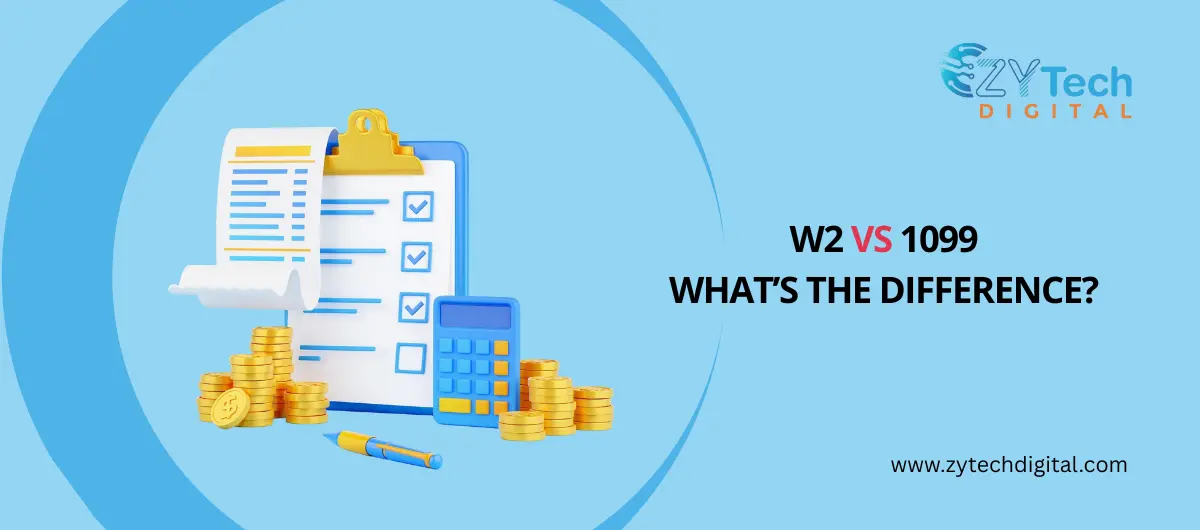
- April 28, 2025
- admin
- 0
If you’re diving into the world of employment and contracting in the U.S., you’ve probably heard people talk about W2 vs 1099. I still remember when I first had to choose between the two — it felt overwhelming! But once I understood the differences, the pros and cons, and how it could impact my taxes and career growth, it got much easier.
In this guide, I’ll walk you through what W2 and 1099 employment really mean, real-life examples, the advantages and challenges of each, and even touch on topics like C2C (Corp-to-Corp) vs W-2, which often confuse many people. Let’s get into it!
What Is W2 Employment?
A W2 employee is someone who works directly for a company. Your employer withholds taxes like federal income tax, Social Security, and Medicare from your paycheck. Every January, you get a W-2 form summarising how much you earned and what was withheld.
Real-Life Example:
When I was working full-time for a marketing agency, I was a W2 employee. They deducted taxes automatically, gave me health benefits, and even contributed to my 401(k) plan.
Contact our career specialists

What Is 1099 Employment in the US?
A 1099 worker is often called an independent contractor or freelancer. Instead of taxes being withheld, you get the full amount of your paycheck, but you’re responsible for paying your taxes later. At the end of the year, you receive a 1099-NEC form if you earned $600 or more from a client.
Real-Life Example:
Later, I started freelancing as a copywriter. One client paid me $2,500 per month, but they didn’t deduct anything for taxes. At tax time, I had to pay estimated quarterly taxes and handle everything myself.
1099 vs W2: Pros and Cons
Choosing between W2 and 1099 comes down to what you value most: security or flexibility.
Pros of W2 Employment:
- Employer covers part of your Social Security and Medicare taxes.
- Benefits like health insurance, paid time off (PTO), and retirement plans.
- Legal protection under labour laws (like minimum wage and overtime).
- More predictable, steady paycheck.
Cons of W2 Employment:
- Less flexibility in work schedule.
- Limited ability to deduct business expenses.
- Less negotiating power over pay rates.
Pros of 1099 Employment:
- Set your schedule — freedom!
- Higher pay rates (because clients don’t have to cover benefits).
- Ability to work for multiple clients.
- Deduct business expenses (home office, software, travel).
Cons of 1099 Employment:
- You must handle your taxes and bookkeeping.
- No benefits unless you buy your insurance.
- No unemployment insurance or workers’ compensation.
- Irregular income streams can be stressful.
W2 vs 1099: Which One Is Better?
You might be wondering, “Which is better, W-2 or 1099?”
Honestly, it depends on your personal goals. When I needed stability to buy a house, W2 employment was a better fit. But when I wanted to travel and control my schedule, 1099 contracts gave me the freedom I craved.
Ask yourself:
- Do I need a steady income and benefits?
- Or do I value independence and control over my workload?
What Is 1099 in US Recruitment?
In U.S. staffing and recruitment, when companies say they’re hiring 1099 workers, they mean independent contractors, not employees.
Recruiters often find 1099 contractors for short-term projects like IT consulting, software development, or graphic design.
Real-Life Example:
A friend of mine was hired through a recruitment agency for a six-month 1099 contract to redesign a mobile app. He worked remotely, set his hours, and billed the company monthly.

W2 vs 1099 Taxes: Big Differences
Taxes can be a huge deciding factor.
| Aspect | W2 | 1099 |
| Tax Withholding | The employer deducts automatically | The contractor pays taxes manually |
| Forms | W2 Form | 1099-NEC Form |
| Self-Employment Tax | No (employer pays half) | Yes (you pay full 15.3%) |
| Quarterly Tax Payments | Not needed | Usually needed |
| Deductions | Limited | Many (home office, travel, etc.) |
What Should You Expect in a W2 Employment Contract?
When you sign a W2 employment contract, expect to see:
- Your salary or hourly wage.
- Benefits like insurance, PTO, and 401(k).
- Work schedule and location.
- Company policies and procedures.
- Termination clauses.
Always read the fine print. Some employers classify workers incorrectly, which can cause IRS trouble!
Which is Better: W2 vs C2C?
Now, let’s quickly talk about W2 vs C2C (Corp-to-Corp).
- W2: You are an employee of a staffing agency or company.
- C2C: You have your corporation (like an LLC) and bill the client through your company.
Real-Life Example:
I once worked W2 through a staffing agency for a big tech company. Later, I switched to C2C under my LLC for another client, which allowed me to save more on taxes but required complex bookkeeping.
In short:
- If you want simplicity, go W2.
- If you have an LLC and want max deductions and control, C2C could be better.
Key Differences Between W2 and 1099
| Feature | W2 Employee | 1099 Contractor |
| Taxes | Withheld by the employer | Self-paid |
| Benefits | Usually included | None |
| Work Control | Employer dictates | Contractor controls |
| Flexibility | Lower | Higher |
| Stability | Higher | Lower |
Real-Life Comparison Story
To hammer this home:
- When I worked W2, I had predictable paychecks, PTO, a 401(k), and health insurance. But I couldn’t choose my hours or travel freely.
- When I worked 1099, I had the freedom to work from Costa Rica, bill multiple clients, and deduct travel expenses. However, managing my taxes was stressful!
Final Thoughts: Which Should You Choose W2 or 1099?
There’s no one-size-fits-all answer.
If you’re looking for security, stability, and benefits, W2 is your best bet.
If you’re craving flexibility, freedom, and higher earning potential, a 1099 might be the right path.
Either way, understanding the differences will empower you to make the best career decisions for yourself, and avoid tax surprises at the end of the year!
Frequently Asked Questions about W2 vs 1099
In the U.S., 1099 employment refers to independent contractors or freelancers who work for a business but are not official employees.
They receive a Form 1099-NEC at tax time instead of a W-2, and they must report and pay all their own federal, state, and self-employment taxes.
It depends on your personal career goals.
W-2 employment is better if you prefer job security, regular paychecks, and employee benefits.
1099 contracting is ideal if you want flexibility, higher pay rates, and the ability to choose your clients.
Many professionals start with W-2 roles to gain experience and later move to 1099 work for more freedom.
In the U.S., 1099 employment refers to independent contractors or freelancers who work for a business but are not official employees.
They receive a Form 1099-NEC at tax time instead of a W-2, and they must report and pay all their own federal, state, and self-employment taxes.
In U.S. recruitment, companies hire 1099 contractors for temporary, project-based, or freelance work without adding them to payroll.
Recruiters look for highly skilled professionals who can work independently under contract agreements.
This type of recruitment is very common in IT, consulting, healthcare, and creative industries.
Choosing between W2 and C2C (Corp-to-Corp) depends on your career situation.
W2 employment is better if you want stability, benefits, and less administrative responsibility.
C2C is better if you own a business entity (LLC or corporation) and prefer working on contracts independently, often earning higher pay but managing your own taxes and benefits.
Typically, 1099 contractors earn higher hourly or project-based rates compared to W-2 employees because they cover their own taxes, insurance, and retirement savings.
However, W-2 employees receive additional value through benefits like healthcare, paid vacations, and job security, which 1099 contractors must account for separately.
Speak With Expert
Fill The Form Below

